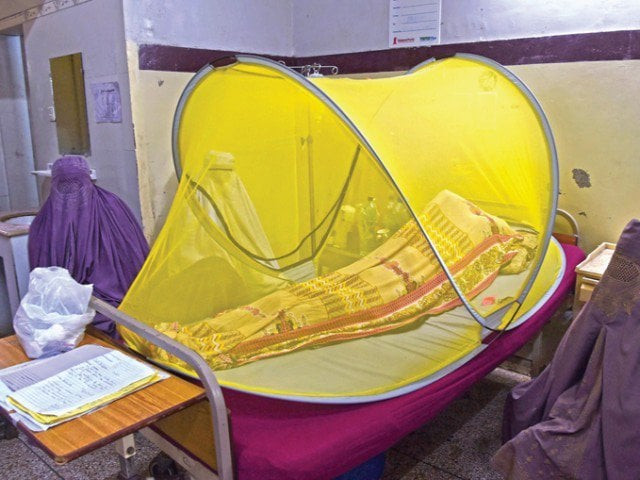NIH urges health authorities to improve dengue prevention
Says it is imperative to be vigilant and take certain steps to limit further transmission

PHOTO: EXPRESS / FILE
According to an official of NIH, keeping in view the past seasonal trends and continuous increase in the number of suspected dengue patients, it is imperative to be vigilant about the situation and take certain steps to limit further transmission.
He said that an advisory has already been issued to the departments concerned to sensitise general public besides taking other steps as fever cases were being reported from different parts of the country.
He said that classic dengue fever is marked by rapid onset of high fever, headache, retro-orbital pain, diffuse body pain in both muscle and bone, weakness, vomiting, sore throat, altered taste sensation, and a centrifugal maculopapular rash, among other manifestations. He added the severity of the pain leads to the term break-bone fever to describe dengue. Sequential infections with different serotypes increase the risk for dengue haemorrhagic fever and dengue shock syndrome.
He said that warning signs included severe abdominal pain, persistent vomiting, marked change in temperature from fever to hypothermia, haemorrhagic manifestations, change in mental status like irritability, confusion and thrombocytopenia.
He said that early signs of shock included restlessness, cold clammy skin, rapid weak pulse, and narrowing of the pulse pressure like systolic and diastolic blood pressure. Patients with dengue fever should be advised to return to the hospital if they develop any of these signs, he added.
He said that there is no specific treatment for the disease and mainly relies on the management of symptoms, however, it is important for the attending physicians to exclude other treatable diagnoses. He said that patients with dengue fever should be cautioned to maintain their intake of oral fluid to avoid dehydration. The most important measure to assist the patient with dengue fever is to carefully evaluate them for impending complications, such as early evidence of dengue haemorrhagic fever.
The official said that careful clinical detection and management of dengue patients can significantly reduce mortality rates from severe dengue. He said that dengue fever is typically a self-limiting disease with a mortality rate of less than one per cent. When treated, dengue haemorrhagic fever has a mortality rate of 2-5%, but when left untreated, the mortality rate may approach up-to 50%, he added.
Published in The Express Tribune, September 24th, 2017.





1724319076-0/Untitled-design-(5)1724319076-0-208x130.webp)













COMMENTS
Comments are moderated and generally will be posted if they are on-topic and not abusive.
For more information, please see our Comments FAQ